 1. Introduction
1. Introduction
2. Sepultura – Arise
3. Metallica – Master of Puppets
4. Coroner – Mental Vortex
5. Morbid Angel – Covenant
Written by Pearson, Devamitra and ObscuraHessian
Introduction
All historical events at some stage pertain to a barrier, or a Rubicon that when crossed marks a watershed in the life cycle of an organism in which an achievement cannot be matched in terms of it’s overall qualities. In particular instances, these successes are such that what succeeds can only be a steady decline, or an outcome that pales in comparison to the glory that prevailed at a particular stage of time. This feature aims to give insight into some known examples of the ‘Pyrrhic Victory’ in the metal genre and give light to releases that represent strengths of once great acts, and at the same time foreshadowed artistic saturation.
A common thread that seems to run through these turning points in the careers of metal bands is the apparent contradiction between a musician’s personal evolution and the progress of the musical style into more authentic and expressive forms in service of the concept. We all understand that a maturing musician is not going to be satisfied with the same apparently simple techniques he mastered upon his first year of guitar practice for ages. He probably has musical heroes he is looking up to and he always wanted to learn that Eddie Van Halen or Ritchie Blackmore solo.
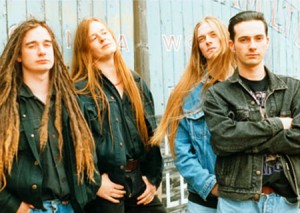 Vital musical forms rely on creativity, spontaneity and message over matter. It is the curse of the artist that often the best of their work is at the behest of youthful lunacy and drunken madness, the early recordings where they grasp at the straws of vision without quite having formulated the techniques for achieving them – so they improvise and as Nietzsche would say, “give birth to a dancing star“. ‘Human‘, ‘Tales from the Thousand Lakes‘ and ‘Heartwork‘ are all perfect examples of a band with the full arsenal of accumulated weapons, evolved to near its maximum potential in knowing exactly how to compose all the contemporary forms of metal, from death metal and grindcore to pop progressive, even soft rock.
Vital musical forms rely on creativity, spontaneity and message over matter. It is the curse of the artist that often the best of their work is at the behest of youthful lunacy and drunken madness, the early recordings where they grasp at the straws of vision without quite having formulated the techniques for achieving them – so they improvise and as Nietzsche would say, “give birth to a dancing star“. ‘Human‘, ‘Tales from the Thousand Lakes‘ and ‘Heartwork‘ are all perfect examples of a band with the full arsenal of accumulated weapons, evolved to near its maximum potential in knowing exactly how to compose all the contemporary forms of metal, from death metal and grindcore to pop progressive, even soft rock.
But here comes the paradox. Instead of sounding updated, the recording sounds more dated every passing year, because what has happened is that the band has incorporated a plethora of archaisms to a sound that used to be cutting edge. The bludgeoning dark tremolos of ‘Leprosy‘ that used to climax in nearly atonal solos become melodious post-modernist “cut up” riff salads; the doomy Wagnerian grandeur and slow movements reminiscent of historical battles in ‘The Karelian Isthmus‘ is stealthily exchanged with stoner rock and circular meditations that happen after a couple too many smoked joints; the to-the-point socio-anatomical parody of the hilariously grotesque and twisted ‘Symphonies of Sickness‘ gets discursive and bloated with instrumental worship, as if the band suddenly turned from anarchists into voters. The core question would be: did the band think these are more sensible ways of composition and a better illustration of the topic at hand – or did they forget the composition and the topic altogether in the name of randomly generating “music” with cold technique?
Sepultura – Arise
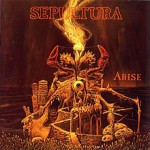 Coming off the back of the raging, deathly, speed metal of ‘Beneath The Remains‘, Sepultura stay true to the compact musical execution that began making itself clear on the ‘Schizophrenia‘ album onwards. There is more variation in pace, with the lower tempo compositions often resemblant of the riotous and anthemic cycles of of ‘Beneath The Remains’ played out in suspended animation. The introduction of the now ‘tribal’ meme that first makes itself present in Sepultura’s music introduces itself through in various songs, and whilst here it is applied in a more than tasteful enough manner it sometimes gives the idea that whilst this indicates an ‘open-mindedness’ to the average listener, on deeper insight it gives light to the possibility that the band by this time may have been starting to run short of creative ideas. Whilst this is a very good record by Sepultura, prevailing characteristics get the upper hand, and in a year where speed metal had long had it’s glory days, and death metal attaining new peaks of aggression in a period of artistic blossom, it’s no surprise looking back that the dumbed down and singularly ‘angry’ mosh-fodder that was ‘Chaos A.D.’ would suceed this work. –Pearson
Coming off the back of the raging, deathly, speed metal of ‘Beneath The Remains‘, Sepultura stay true to the compact musical execution that began making itself clear on the ‘Schizophrenia‘ album onwards. There is more variation in pace, with the lower tempo compositions often resemblant of the riotous and anthemic cycles of of ‘Beneath The Remains’ played out in suspended animation. The introduction of the now ‘tribal’ meme that first makes itself present in Sepultura’s music introduces itself through in various songs, and whilst here it is applied in a more than tasteful enough manner it sometimes gives the idea that whilst this indicates an ‘open-mindedness’ to the average listener, on deeper insight it gives light to the possibility that the band by this time may have been starting to run short of creative ideas. Whilst this is a very good record by Sepultura, prevailing characteristics get the upper hand, and in a year where speed metal had long had it’s glory days, and death metal attaining new peaks of aggression in a period of artistic blossom, it’s no surprise looking back that the dumbed down and singularly ‘angry’ mosh-fodder that was ‘Chaos A.D.’ would suceed this work. –Pearson
Metallica – Master Of Puppets
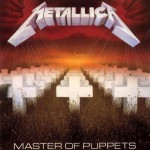 A controversial pick, Metallica’s excellent third album fulfills the incorporation of progressive themes but seems to crystallize them to such an extent that no more creative spark would emanate from their later works. Cliff Burton’s presence in the unit, and his bridging of neo-classicist influences into their progressive speed metal was a defining feature of what many hessians and metallers saw to be the main component of their excellence. Having let this seep in on ‘Kill Em All‘ and fully realise itself on ‘Ride The Lightning‘, ‘Master Of Puppets’ steps further towards punchier and anthemic songs, with a steeping emphasis on percussive, palm-muted rhythm riffs which are the dominant motif in the album’s musical execution. This is structurally still in the exact same mould as ‘Ride The Lightining’, in that despite a different order of where songs are, we get aggression in ‘Damage Inc.’ and ‘Battery’ where there was once ‘Fight Fire With Fire’ and ‘Trapped Under Ice’. Songs such as ‘Sanitarium’ continue a rock music inclined sense of songwriting that continues what started with ‘Fade To Black’ and inevitably foreshadows the growing commercialism of Metallica on later releases. The excellence of ‘Orion’ also signals a continuity shift that began with ‘Anesthesia (Pulling Teeth)’ and fulfilled itself with the ‘Call Of Ktulu’ instrumental. This is a great album that solidifies the importance of Metallica in the genre’s history, though the death of Cliff Burton and the lack of creative steam that ensued signalled the artistic decline that came in 1988 with ‘And Justice For All…’. –Pearson
A controversial pick, Metallica’s excellent third album fulfills the incorporation of progressive themes but seems to crystallize them to such an extent that no more creative spark would emanate from their later works. Cliff Burton’s presence in the unit, and his bridging of neo-classicist influences into their progressive speed metal was a defining feature of what many hessians and metallers saw to be the main component of their excellence. Having let this seep in on ‘Kill Em All‘ and fully realise itself on ‘Ride The Lightning‘, ‘Master Of Puppets’ steps further towards punchier and anthemic songs, with a steeping emphasis on percussive, palm-muted rhythm riffs which are the dominant motif in the album’s musical execution. This is structurally still in the exact same mould as ‘Ride The Lightining’, in that despite a different order of where songs are, we get aggression in ‘Damage Inc.’ and ‘Battery’ where there was once ‘Fight Fire With Fire’ and ‘Trapped Under Ice’. Songs such as ‘Sanitarium’ continue a rock music inclined sense of songwriting that continues what started with ‘Fade To Black’ and inevitably foreshadows the growing commercialism of Metallica on later releases. The excellence of ‘Orion’ also signals a continuity shift that began with ‘Anesthesia (Pulling Teeth)’ and fulfilled itself with the ‘Call Of Ktulu’ instrumental. This is a great album that solidifies the importance of Metallica in the genre’s history, though the death of Cliff Burton and the lack of creative steam that ensued signalled the artistic decline that came in 1988 with ‘And Justice For All…’. –Pearson
Coroner – Mental Vortex
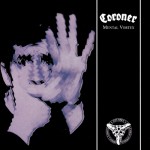 While the speed and thrash metal boom was crumbling all around in the wake of Seattle and LA-based clothing styles storming the nation, a few European stalwarts lingered on the fringes and while some of them didn’t dare to take up the arms for intricate, narrative death metal, they were influenced by its vicious aggression and psychedelic subject matter. Coroner from Zürich, around Tom G. Warrior‘s circle of the tyrants, never became a vastly recognized or influential name in extreme metal but superceded most of its peers in technicality and consistency, releasing a discography of five albums ranging from the raging “R.I.P.” to the eclectic “Grin“, where the fourth one “Mental Vortex” is where the playing abilities peak but the ultimate purpose of the band is starting to wane. When the idealism of youth fades and with it the spontaneous power of iconographic assault, the only avenue left for speed metal to challenge the moral preconceptions of hypocritical generations was to turn to psychology and explore lies and paranoia in the internal spheres, cutting up joy and sadness into fusion-esque rhythm riff salads (with the timing of an atomic clock) cut up from brilliant small pieces akin to Burroughs’ or Gysin’s style of literature. Such a hectic style provides an engaging rhythmic tension for this album, arguably one of the last triumphs of the entire genre, but it’s also cold and calculated like a scientific experiment. The vastly more popular but not much better Carcass realized essentially the same things many years later on their hit album “Heartwork” and ended up on the pages of guitar magazines, while Coroner was already entombed to the mausoleums of Noise Records’ speed metal roster. –Devamitra
While the speed and thrash metal boom was crumbling all around in the wake of Seattle and LA-based clothing styles storming the nation, a few European stalwarts lingered on the fringes and while some of them didn’t dare to take up the arms for intricate, narrative death metal, they were influenced by its vicious aggression and psychedelic subject matter. Coroner from Zürich, around Tom G. Warrior‘s circle of the tyrants, never became a vastly recognized or influential name in extreme metal but superceded most of its peers in technicality and consistency, releasing a discography of five albums ranging from the raging “R.I.P.” to the eclectic “Grin“, where the fourth one “Mental Vortex” is where the playing abilities peak but the ultimate purpose of the band is starting to wane. When the idealism of youth fades and with it the spontaneous power of iconographic assault, the only avenue left for speed metal to challenge the moral preconceptions of hypocritical generations was to turn to psychology and explore lies and paranoia in the internal spheres, cutting up joy and sadness into fusion-esque rhythm riff salads (with the timing of an atomic clock) cut up from brilliant small pieces akin to Burroughs’ or Gysin’s style of literature. Such a hectic style provides an engaging rhythmic tension for this album, arguably one of the last triumphs of the entire genre, but it’s also cold and calculated like a scientific experiment. The vastly more popular but not much better Carcass realized essentially the same things many years later on their hit album “Heartwork” and ended up on the pages of guitar magazines, while Coroner was already entombed to the mausoleums of Noise Records’ speed metal roster. –Devamitra
Morbid Angel – Covenant
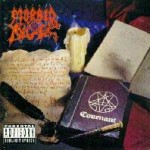 Among the most ancient, recognisable and influential cults in Death Metal’s history, Morbid Angel’s tale of decline is a prolonged one, and raised continuous questions about the band’s creative state, as though their instruments were being channelled purely at the whim of the Outer Gods. The Floridan giants finally resisted the unearthly impulses that once guided them to create powerful statements of occult awareness bound up with a Nietzschean sense of overcoming and will-to-power, such that with the releases of ‘Gateways of Annihilation’ and ‘Heretic’, the band fell victim to triviality. Incremental lapses in quality can be traced back to much earlier albums however, with the departure of guitarist Richard Brunelle being the first to impact the legendary line-up responsible for two of the finest Metal albums ever recorded, meaning that ‘Covenant’ would initiate the band’s slow decay. In addition, Morbid Angel’s growing populist tendencies were perhaps never more commercially viable than at this time, with the production left in the hands of Fleming Rasmussen, and not one but two music videos filmed to promote the album. Brunelle’s exit would mean that Trey Azagthoth would be fully responsible for filling the suffocating mix with his trademarked guitarwork, to the surprising detriment of ‘Covenant’s sound wherever the album’s conceptual direction becomes overwhelmed by a one-dimensional bluntness. Characterised by unfocused and uniform phrasing and only held in place by Pete Sandoval’s tightly militaristic drumming, the latter half of the album demonstrates little of the dynamism that could be heard on every one of their preceeding songs. The spiritual inversion of Morbid Angel, a transvaluation of religious language to re-vitalise and Paganise the path of transcendence and condemn the submissive and world-denying, corrupt parasites turns into an unaltering, blind rage that’s summarised by the lyric of ‘God of Emptiness‘, “So, what makes you supreme?”, setting a blueprint for the band to follow on ‘Domination‘ and the hordes of imitators that were given an undeserved license to record by virtue of Death Metal’s growing popularity. ‘Covenant’ in this sense is not dissimilar to Deicide’s Pyrrhic fall from the adept demonology of ‘Legion‘ to the dumbed-down ‘Once Upon the Cross‘, though Azagthoth’s wizardry would earn Morbid Angel some redemption with the primordial dance of cosmic energies to be heard on ‘Formulas Fatal to the Flesh‘ before finally digging their own grave without cursing their own reputation quite as badly as the truly shattered idols from the golden age of Death Metal. –ObscuraHessian
Among the most ancient, recognisable and influential cults in Death Metal’s history, Morbid Angel’s tale of decline is a prolonged one, and raised continuous questions about the band’s creative state, as though their instruments were being channelled purely at the whim of the Outer Gods. The Floridan giants finally resisted the unearthly impulses that once guided them to create powerful statements of occult awareness bound up with a Nietzschean sense of overcoming and will-to-power, such that with the releases of ‘Gateways of Annihilation’ and ‘Heretic’, the band fell victim to triviality. Incremental lapses in quality can be traced back to much earlier albums however, with the departure of guitarist Richard Brunelle being the first to impact the legendary line-up responsible for two of the finest Metal albums ever recorded, meaning that ‘Covenant’ would initiate the band’s slow decay. In addition, Morbid Angel’s growing populist tendencies were perhaps never more commercially viable than at this time, with the production left in the hands of Fleming Rasmussen, and not one but two music videos filmed to promote the album. Brunelle’s exit would mean that Trey Azagthoth would be fully responsible for filling the suffocating mix with his trademarked guitarwork, to the surprising detriment of ‘Covenant’s sound wherever the album’s conceptual direction becomes overwhelmed by a one-dimensional bluntness. Characterised by unfocused and uniform phrasing and only held in place by Pete Sandoval’s tightly militaristic drumming, the latter half of the album demonstrates little of the dynamism that could be heard on every one of their preceeding songs. The spiritual inversion of Morbid Angel, a transvaluation of religious language to re-vitalise and Paganise the path of transcendence and condemn the submissive and world-denying, corrupt parasites turns into an unaltering, blind rage that’s summarised by the lyric of ‘God of Emptiness‘, “So, what makes you supreme?”, setting a blueprint for the band to follow on ‘Domination‘ and the hordes of imitators that were given an undeserved license to record by virtue of Death Metal’s growing popularity. ‘Covenant’ in this sense is not dissimilar to Deicide’s Pyrrhic fall from the adept demonology of ‘Legion‘ to the dumbed-down ‘Once Upon the Cross‘, though Azagthoth’s wizardry would earn Morbid Angel some redemption with the primordial dance of cosmic energies to be heard on ‘Formulas Fatal to the Flesh‘ before finally digging their own grave without cursing their own reputation quite as badly as the truly shattered idols from the golden age of Death Metal. –ObscuraHessian
Tags: arise, carcass, coroner, Covenant, Heartwork, master of puppets, mental vortex, metallica, morbid angel, selling out, sepultura, zine-zines
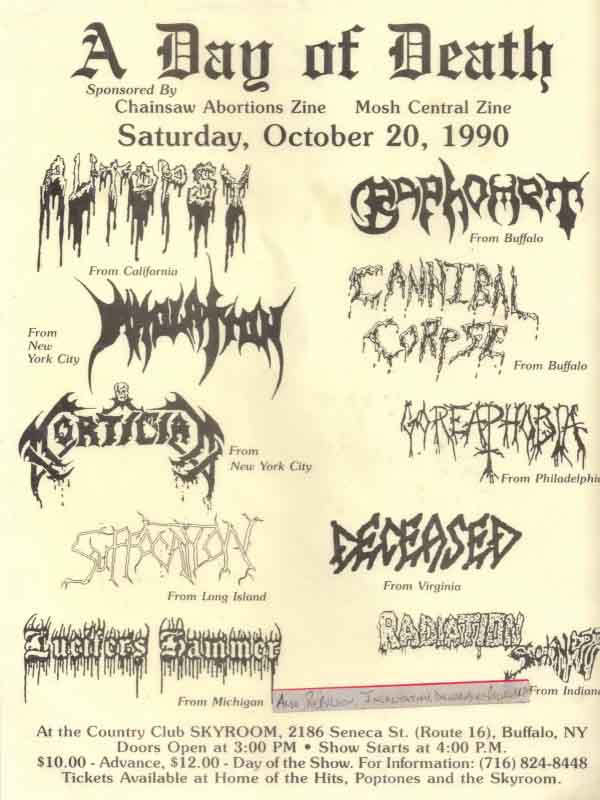
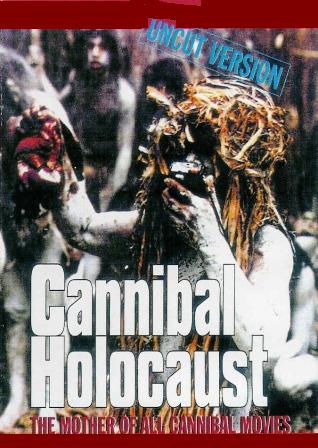 This is by no means the easiest of films to watch. It has numerous flaws and executions within the film that would provoke one to make immediate criticism, for example the sub-par, almost at times robotic acting and unimaginative script, and what could indeed be labelled a lack of cohesion (could this be due to editing and censoring? I am not sure), Cannibal Holocaust never ceases to shock and provoke, as well as provoke immediate questions of ‘who are the real savages?’ and how people might want to generally assess their modern, non-organic way of living.
This is by no means the easiest of films to watch. It has numerous flaws and executions within the film that would provoke one to make immediate criticism, for example the sub-par, almost at times robotic acting and unimaginative script, and what could indeed be labelled a lack of cohesion (could this be due to editing and censoring? I am not sure), Cannibal Holocaust never ceases to shock and provoke, as well as provoke immediate questions of ‘who are the real savages?’ and how people might want to generally assess their modern, non-organic way of living.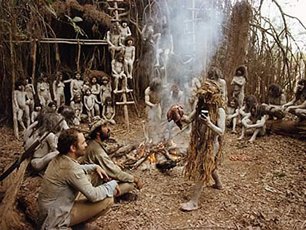
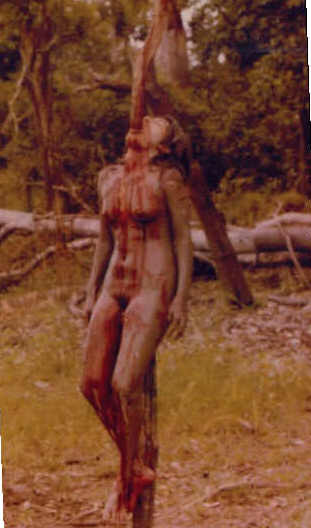 The most redeeming features of the film are the soundtrack by Riz Ortolani, which utilises rather dated synthesisers alongside a string orchestra, often interspersed with music that sounds not too dissimilar to Italian religous music, with arpeggiated acoustic guitars playing upbeat music that adds a brilliantly sarcastic touch to an otherwise grim and unrelenting series of violent acts. The usage of hand-held camera is very effective. As opposed to films where every scene is portrayed from a multi-angle perceptive, we see absolute realism for the most part, and is done in a non-perfective, improvised fashion that otherwise contributes heavily to making the film for the most part, very convincing. Cannibal Holocaust is flawed, yes. But it is a triumph of the cold, efficient will. Unlike the humoured (but still excellent) Dawn Of The Dead, Cannibal Holocaust is the work of the cynical sociopath, and seems to metaphorically imply that when one reaches or exceeds a certain threshold of excess, be it due to ignorance, lust, greed, self-indulgence etc, there is not even the vaguest chance of redemption. In a sense, the message of this film is an all-out war against the modern way, and the belief that furthering it to those who are otherwise unwilling to accept it is nothing short of a disastrous consequence. The film also suceeds in that it doesnt moralise about the issues it raises, and also leaves the film open to many possible interperatations. Overlooked by critics for its very bad acting, reviled by the politically correct, adored by much of the exploitation crowd, here is a film which holds truths and meanings beyond a framework that would isolate and sicken many.
The most redeeming features of the film are the soundtrack by Riz Ortolani, which utilises rather dated synthesisers alongside a string orchestra, often interspersed with music that sounds not too dissimilar to Italian religous music, with arpeggiated acoustic guitars playing upbeat music that adds a brilliantly sarcastic touch to an otherwise grim and unrelenting series of violent acts. The usage of hand-held camera is very effective. As opposed to films where every scene is portrayed from a multi-angle perceptive, we see absolute realism for the most part, and is done in a non-perfective, improvised fashion that otherwise contributes heavily to making the film for the most part, very convincing. Cannibal Holocaust is flawed, yes. But it is a triumph of the cold, efficient will. Unlike the humoured (but still excellent) Dawn Of The Dead, Cannibal Holocaust is the work of the cynical sociopath, and seems to metaphorically imply that when one reaches or exceeds a certain threshold of excess, be it due to ignorance, lust, greed, self-indulgence etc, there is not even the vaguest chance of redemption. In a sense, the message of this film is an all-out war against the modern way, and the belief that furthering it to those who are otherwise unwilling to accept it is nothing short of a disastrous consequence. The film also suceeds in that it doesnt moralise about the issues it raises, and also leaves the film open to many possible interperatations. Overlooked by critics for its very bad acting, reviled by the politically correct, adored by much of the exploitation crowd, here is a film which holds truths and meanings beyond a framework that would isolate and sicken many.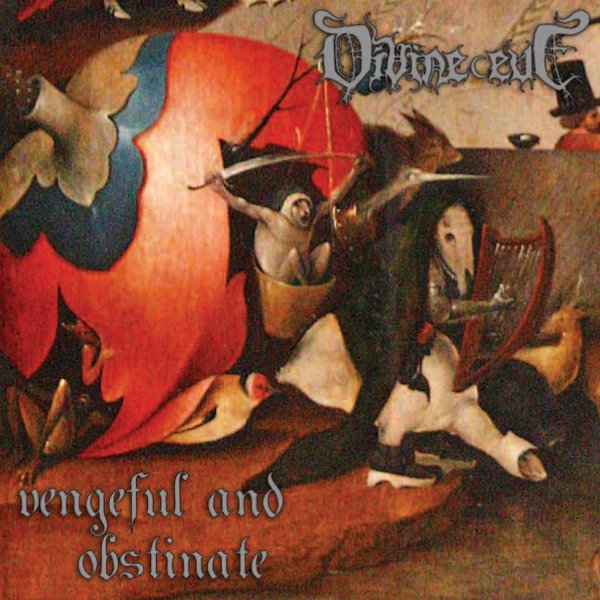
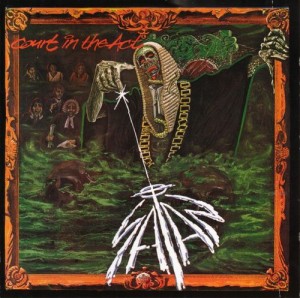
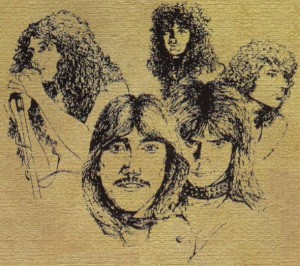 nlike many albums of the NWOBHM there is no real incohesion or disruption halting the flow of compositional prowess. Quite an archaic use of notation that makes great use of pentatonics, yet moderates the restraints of blues and R&B music, has something more in common with European music of centuries past. If one were to imagine listening and removing the aesthetics of the modern band-set up, and replacing the electrical distortions of the guitars with perhaps harpsichord or sole acoustic guitar in it’s place a bridge can more or less be established as an imaginative transition to a modern form of music. One of the absolute best releases of traditional metal, this is highly overlooked and highly recommended.
nlike many albums of the NWOBHM there is no real incohesion or disruption halting the flow of compositional prowess. Quite an archaic use of notation that makes great use of pentatonics, yet moderates the restraints of blues and R&B music, has something more in common with European music of centuries past. If one were to imagine listening and removing the aesthetics of the modern band-set up, and replacing the electrical distortions of the guitars with perhaps harpsichord or sole acoustic guitar in it’s place a bridge can more or less be established as an imaginative transition to a modern form of music. One of the absolute best releases of traditional metal, this is highly overlooked and highly recommended.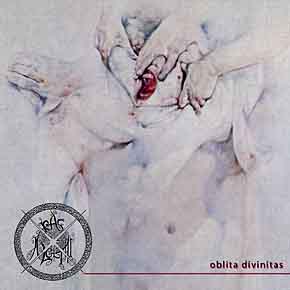
 Ghoulish, ethereal and enwrapped in a magnetic tape production reeking of ancient tombs and broken 4-trackers, Helheim’s vision of industrial black metal is far more elemental than the connotations of that description during the last decade. As with the primitivist throbbing drum machines of Mysticum and the ambient blankets of Sort Vokter, the aim is ritual-hypnotic music which does not try to spice up black metal in order to make it more comforting or exciting; instead, it challenges one’s concentration by looping, returning and rewiring little fragments and pieces of riff in powerful early Norwegian black metal language, conducted by the raging screams of the now-deceased vocalist Jon A. Bjerk. The svastika simulacrum depicted on the cover highlights the natural difference with the smoother approach of the other Helheim of the same era, famed mostly for the vagrant mythological epics of “Jormundgand” – this Helheim rather spits in the face of the observed tradition in order to bring forth the subconscious terror of life and death that has been embedded in the mythos of all ancient cultures and bring across a pertinent message to the civilization (macrocosmically) and the black metal of our time (microcosmically). –Devamitra
Ghoulish, ethereal and enwrapped in a magnetic tape production reeking of ancient tombs and broken 4-trackers, Helheim’s vision of industrial black metal is far more elemental than the connotations of that description during the last decade. As with the primitivist throbbing drum machines of Mysticum and the ambient blankets of Sort Vokter, the aim is ritual-hypnotic music which does not try to spice up black metal in order to make it more comforting or exciting; instead, it challenges one’s concentration by looping, returning and rewiring little fragments and pieces of riff in powerful early Norwegian black metal language, conducted by the raging screams of the now-deceased vocalist Jon A. Bjerk. The svastika simulacrum depicted on the cover highlights the natural difference with the smoother approach of the other Helheim of the same era, famed mostly for the vagrant mythological epics of “Jormundgand” – this Helheim rather spits in the face of the observed tradition in order to bring forth the subconscious terror of life and death that has been embedded in the mythos of all ancient cultures and bring across a pertinent message to the civilization (macrocosmically) and the black metal of our time (microcosmically). –Devamitra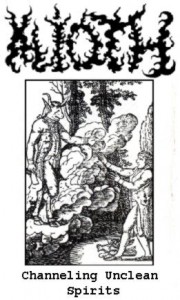 Remember how disappointed you were the last time you heard a new Varathron or Rotting Christ album? If the same lack of consistency and effort permeates other areas of Greek society, them having descended from the mythic glory of Athene into debts and poverty needs hardly the prophetic eye of Cassandra to fully explain. As in Neil Gaiman’s fantasy novel “American Gods” the lost European deities are found prowling the Wisconsin backwoods, Chicago based Alioth’s mystical and sensual tribute to Hellenic black metal ca. 1993 is admirably not only a continuation of the electric technoid dynamo drumbeat and an application of the palm muted speed and doom riffs in esoteric underground context; it’s also a highly logically strung sequence of moods as if the physical organization of pain and pleasure in a Dionysian ritual theatre, succumbing with the heavy held back moments of “The Channeling” and “Apocryphal Dimensions” and rising through the interludial “Invocation” and “Invocation II” to softly expire orgasmic relaxation. So much could be created out of this basic concept that it’s a pity the full-length album has remained cloaked in the depths of the primal sea, while Wargoat Obscurum iterates far less subtle (and far less interesting) metal with Cult of Daath. –Devamitra
Remember how disappointed you were the last time you heard a new Varathron or Rotting Christ album? If the same lack of consistency and effort permeates other areas of Greek society, them having descended from the mythic glory of Athene into debts and poverty needs hardly the prophetic eye of Cassandra to fully explain. As in Neil Gaiman’s fantasy novel “American Gods” the lost European deities are found prowling the Wisconsin backwoods, Chicago based Alioth’s mystical and sensual tribute to Hellenic black metal ca. 1993 is admirably not only a continuation of the electric technoid dynamo drumbeat and an application of the palm muted speed and doom riffs in esoteric underground context; it’s also a highly logically strung sequence of moods as if the physical organization of pain and pleasure in a Dionysian ritual theatre, succumbing with the heavy held back moments of “The Channeling” and “Apocryphal Dimensions” and rising through the interludial “Invocation” and “Invocation II” to softly expire orgasmic relaxation. So much could be created out of this basic concept that it’s a pity the full-length album has remained cloaked in the depths of the primal sea, while Wargoat Obscurum iterates far less subtle (and far less interesting) metal with Cult of Daath. –Devamitra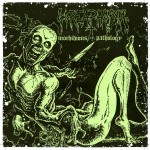 Goreaphobia’s debut album wouldn’t have been quite so eagerly anticipated without a strong back catalogue of minor releases such as the ‘Morbidious Pathology’ demo, which provides an unexpected listening experience if Mortal Repulsion is the only recording you’ve heard from the band. Where the full-length communicates visions from the abyss through the blank eyes of an old mystic locked in a lucid dreaming state, this demo is full of enough youthful energy to express the paranoia of a thousand souls trapped within the claustrophobic confines of their own mortality. Variations in riffs reflect these tightly packed structures, seeming to progress with not so much a linear logic than the re-arranging of parts of the whole, like limbs being removed from a body and sewn on to somewhere else entirely until the true grotesqueness of humanity is revealed. As with Mortal Repulsion, despite the physical connections to Incantation, there is a stronger similarity to the craftsmanship of Immolation and albums that would come in later years, such as the complex and disjointed but melodically evocative Here in After. The lead guitar work, though highly restrained, possesses a sense of neoclassical refinement that bridges some short-burst riffage with eloquent but totally disturbing solos. This demo shows the beginnings of an all too rare experiment in Death Metal where you can observe the maturation of a consistant idea as it goes through the turmoil of a tortured, temporal existence. –ObscuraHessian
Goreaphobia’s debut album wouldn’t have been quite so eagerly anticipated without a strong back catalogue of minor releases such as the ‘Morbidious Pathology’ demo, which provides an unexpected listening experience if Mortal Repulsion is the only recording you’ve heard from the band. Where the full-length communicates visions from the abyss through the blank eyes of an old mystic locked in a lucid dreaming state, this demo is full of enough youthful energy to express the paranoia of a thousand souls trapped within the claustrophobic confines of their own mortality. Variations in riffs reflect these tightly packed structures, seeming to progress with not so much a linear logic than the re-arranging of parts of the whole, like limbs being removed from a body and sewn on to somewhere else entirely until the true grotesqueness of humanity is revealed. As with Mortal Repulsion, despite the physical connections to Incantation, there is a stronger similarity to the craftsmanship of Immolation and albums that would come in later years, such as the complex and disjointed but melodically evocative Here in After. The lead guitar work, though highly restrained, possesses a sense of neoclassical refinement that bridges some short-burst riffage with eloquent but totally disturbing solos. This demo shows the beginnings of an all too rare experiment in Death Metal where you can observe the maturation of a consistant idea as it goes through the turmoil of a tortured, temporal existence. –ObscuraHessian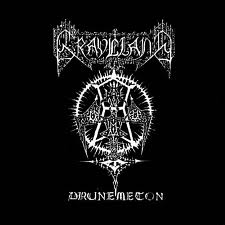 It’s not difficult to understand the distaste that Darken has for the recordings commited to tape during Graveland’s infancy in the light of his recent catalogue of pristine, epic and Atlantaean creations. Some distance away from the expansive scenes of battlefields and expressions of Romantic nationalism, this ancient offering from the living master of Pagan Black Metal is totally shrouded in a necrotic production, like ghostly shadows moving through oaken forests, casting a spell within more cloistered and Druidic surroundings than the output of Graveland from the past 15 years. Alongside the visions that created the force of Scandinavian Black Metal in the early 90′s, this demo represents the reclusive and misanthropic esotericism of that era, especially the primality of the lowest fidelity cults, Beherit and Ildjarn. Sounding like the work of a punk ostracised by that increasingly over-socialised group for being too idealistic and inhuman, Darken conjures a lurid interpretation of hypnotic Bathorean riffing that develops through the echoing of majestic, synthesised voices that open this recording as though a prologue to ‘The Celtic Winter’. The experimentation with primitivism in ‘Drunemeton’ is so deconstructionist that the guitar technique becomes fragmented completely and subordinated to reveal gloomy ambient moods that amplify the silence of a forest at night before the dawn of battle. There’s a similarity to the Beherit song ‘Nuclear Girl’ in how the guitar is used more like a sample, reverberating it’s texture through the keyboards to emphasise a cloistered sensation, accompanied by monastic chants at other times. Culminating in the ambient classic, ‘The Forest of Nemeton’, this demo is the successful beginnings of Graveland’s exploration into unconventional and nihilistic territory beneath the folky phrasing of guitar-led melodic work, which would shape the dynamic of his entire discography to follow. –ObscuraHessian
It’s not difficult to understand the distaste that Darken has for the recordings commited to tape during Graveland’s infancy in the light of his recent catalogue of pristine, epic and Atlantaean creations. Some distance away from the expansive scenes of battlefields and expressions of Romantic nationalism, this ancient offering from the living master of Pagan Black Metal is totally shrouded in a necrotic production, like ghostly shadows moving through oaken forests, casting a spell within more cloistered and Druidic surroundings than the output of Graveland from the past 15 years. Alongside the visions that created the force of Scandinavian Black Metal in the early 90′s, this demo represents the reclusive and misanthropic esotericism of that era, especially the primality of the lowest fidelity cults, Beherit and Ildjarn. Sounding like the work of a punk ostracised by that increasingly over-socialised group for being too idealistic and inhuman, Darken conjures a lurid interpretation of hypnotic Bathorean riffing that develops through the echoing of majestic, synthesised voices that open this recording as though a prologue to ‘The Celtic Winter’. The experimentation with primitivism in ‘Drunemeton’ is so deconstructionist that the guitar technique becomes fragmented completely and subordinated to reveal gloomy ambient moods that amplify the silence of a forest at night before the dawn of battle. There’s a similarity to the Beherit song ‘Nuclear Girl’ in how the guitar is used more like a sample, reverberating it’s texture through the keyboards to emphasise a cloistered sensation, accompanied by monastic chants at other times. Culminating in the ambient classic, ‘The Forest of Nemeton’, this demo is the successful beginnings of Graveland’s exploration into unconventional and nihilistic territory beneath the folky phrasing of guitar-led melodic work, which would shape the dynamic of his entire discography to follow. –ObscuraHessian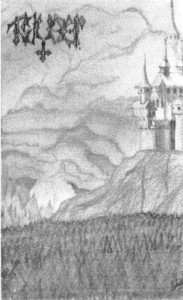 Fifteen years ago, we were too proud and lofty to listen to it, our sensory devices soothed and inflamed by Panzerfaust, Battles in the North and Høstmørke, while the new generation of neo-progressive and mainstream black metal bands sought to enrapture even wider audiences with movie soundtrack influenced keyboards and angelic female voice conjured by fat-bottomed gothic tarts. For the atmospheric maniacs only, as it’s hard to argue for its musicality against the likes of Vikingligr Veldi; but the epic wanderlust and distorted pagan death ritual of this demo’s centerpiece, “Fimbulwinter”, unfolding like a flower at dawn or the psychedelic mandala of LSD invading brain receptors, is one of the pure innocent and mesmerizing gems of underground black metal in this sacred and forsaken era. The primal Isvind-esque melody dance like ripples of waves on a forest pond, the hissing tracker production complete with the macabre clack of a drum machine and the dampness of a Nordic bedroom cellar permeate the recording to such a thickness of adolescent black metal fury that it’s hardly palatable to generic audiences then and now. Barely a trace of the fast norsecore of the more familiar debut album Kill For Satan is noticeable here, the only similarity being the guitarist Draugluin’s technique of bricklike tremolo chord architecture where rhythm plays little importance. While primitive, this compositional method bears an intrinsic beauty which is worthy of recapitulation when the pure augustness of early Norwegian black metal has mostly become forgotten in favour of seemingly more rich and elaborate indie stylings. –Devamitra
Fifteen years ago, we were too proud and lofty to listen to it, our sensory devices soothed and inflamed by Panzerfaust, Battles in the North and Høstmørke, while the new generation of neo-progressive and mainstream black metal bands sought to enrapture even wider audiences with movie soundtrack influenced keyboards and angelic female voice conjured by fat-bottomed gothic tarts. For the atmospheric maniacs only, as it’s hard to argue for its musicality against the likes of Vikingligr Veldi; but the epic wanderlust and distorted pagan death ritual of this demo’s centerpiece, “Fimbulwinter”, unfolding like a flower at dawn or the psychedelic mandala of LSD invading brain receptors, is one of the pure innocent and mesmerizing gems of underground black metal in this sacred and forsaken era. The primal Isvind-esque melody dance like ripples of waves on a forest pond, the hissing tracker production complete with the macabre clack of a drum machine and the dampness of a Nordic bedroom cellar permeate the recording to such a thickness of adolescent black metal fury that it’s hardly palatable to generic audiences then and now. Barely a trace of the fast norsecore of the more familiar debut album Kill For Satan is noticeable here, the only similarity being the guitarist Draugluin’s technique of bricklike tremolo chord architecture where rhythm plays little importance. While primitive, this compositional method bears an intrinsic beauty which is worthy of recapitulation when the pure augustness of early Norwegian black metal has mostly become forgotten in favour of seemingly more rich and elaborate indie stylings. –Devamitra

